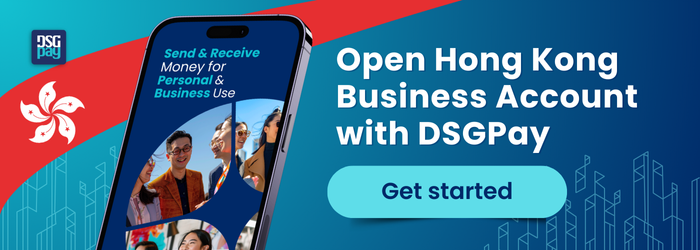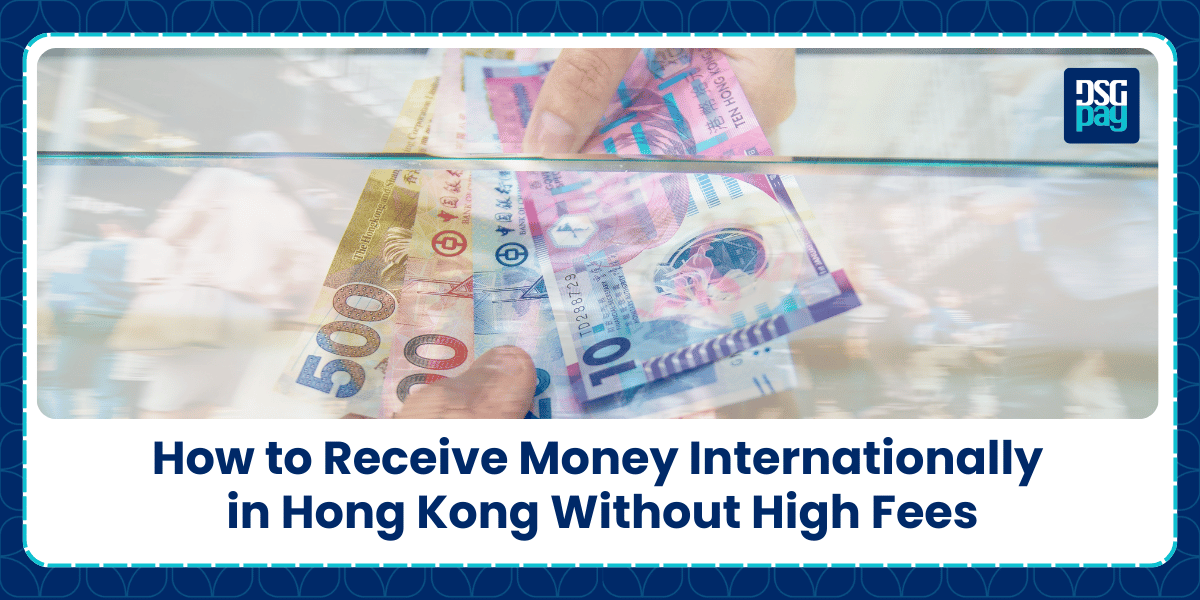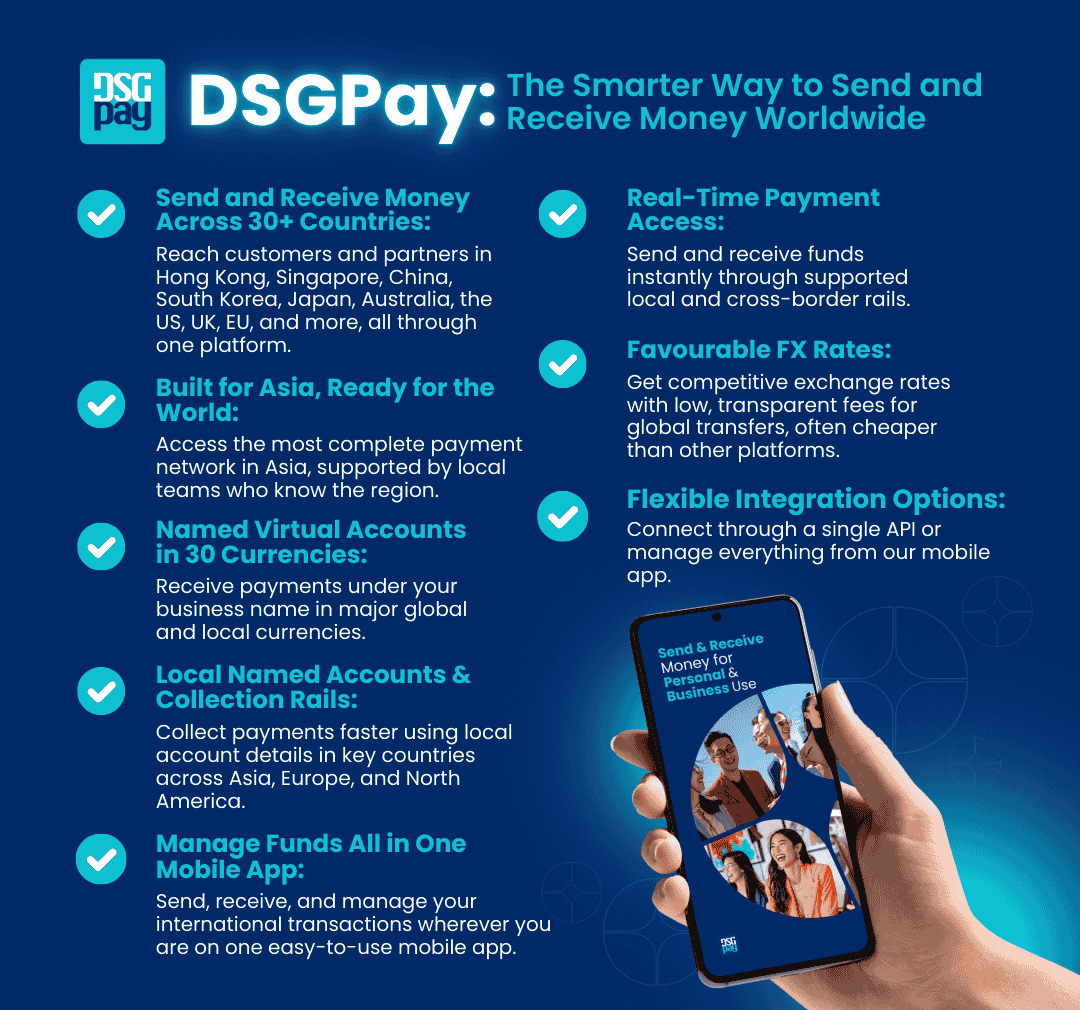Hong Kong remains one of Asia’s most significant global financial hubs. With its thriving startup ecosystem, vibrant trade networks, and rising number of expats and international professionals, the growing need to receive money internationally in Hong Kong is more prevalent than ever.
However, in many cases, expats or foreigners often face issues such as restricted service networks, transfer limits, high costs, and more.
To help, this guide will explore some of the best ways to receive money internationally in Hong Kong without paying exorbitant prices. We’ll also discuss some tips to help you make the right decision.
Let’s get into it!
Table of Contents
Key Takeaways:
- Traditional bank transfers may lack speed and favourable exchange rates, but remain a trusted method.
- Digital platforms like Wise, Payoneer, and Revolut offer cheaper, faster alternatives for receiving international payments, especially for freelancers and businesses.
- DSGPay stands out as a smarter alternative, providing low-cost, multi-currency virtual accounts with real-time tracking and no hidden charges.
Best Ways to Receive Money Internationally in Hong Kong (2026)
1. Traditional Bank Transfers
Most major banks in Hong Kong, including HSBC, Hang Seng, and Bank of China, support international transfers via SWIFT. While widely accepted, this method can involve higher fees and longer processing times compared to alternative solutions.
1.1 HSBC Hong Kong
HSBC (The Hong Kong and Shanghai Banking Corporation) is a global banking leader established in 1865. It’s the biggest bank incorporated in Hong Kong and has an extensive international network. It’s often seen as a reliable choice for businesses with cross-border needs.
Pros:
- They have an extensive global presence, even in non-Asian countries.
- They offer multi-currency accounts, which makes it convenient for international transactions.
- They offer free and instant transfers to any HSBC account worldwide for eligible customers.
- They offer various account types for personal, commercial, and corporate banking.
Cons:
- HSBC often includes a markup on the exchange rate, usually around 2.4%-3.5%
- Typically, their transfers only go to other HSBC accounts, which can be limiting if the recipient does not have one.
- There are specific cut-off times for different currencies and payment methods, which can affect same-day processing.
1.2 Standard Chartered Hong Kong
Standard Chartered is another prominent international bank with a strong presence in Hong Kong. They particularly specialise in serving SMEs and international businesses.
Pros:
- For Priority Private and Priority Banking clients, certain online international remitances can offer a zero service fee to over 200 destinations in 24 currencies.
- Offers same-day arrival to Australia, Euro Zone countries, the UK, and Singapore in local currencies for eligible remittances.
Cons:
- Very high fees, especially for telegraphic transfers, which are charged for overseas clients.
- Overseas applicants usually have to pay an account opening fee and monthly maintenance fees.
- There are daily remittance caps and restrictions on modifying or cancelling completed remittance instructions.
1.3 Bank of China (Hong Kong) (BOCHK)
BOCHK is a major commercial banking group in Hong Kong and serves as a crucial link for businesses and individuals with strong connections to Mainland China. It is the 2nd largest commercial banking group in Hong Kong.
Pros:
- Has a strong network of branches between Mainland China and Hong Kong, which supports cross-border banking needs.
- Provides competitive multi-currency accounts and integrated cross-border banking services.
- Supports integrated services with HKD, foreign currencies, and QR Cash withdrawals.
Cons:
- Generally has higher fees and minimum deposit requirements, especially for Mainland China companies.
- Has a very long account opening process.
- They have less competitive exchange rates, which make transfers more expensive.
- SWIFT payments typically take 3-5 business days.

2. Digital Payment Platforms
Digital payment platforms allow users to send and receive money internationally through web-based applications and mobile wallets. They often feature better transparency, faster processing, and lower fees. Many digital platforms operate outside of traditional SWIFT networks, which means fewer intermediary charges and a more user-friendly experience. Some of them are:
2.1 Wise (Formerly TransferWise)
Wise is known for its transparency and use of the real mid-market exchange rates. They allow clients to receive international payments into their HKD accounts.
Pros:
- They charge low fees.
- Has faster processing times (often same day or next day)
- Mid-market exchange rate (no hidden markup)
- Multi-currency accounts are available
Cons:
- Requires bank accounts on both ends.
- Customer support quality may be inconsistent.
- It is not the cheapest for huge transfers.
2.2 Payoneer
This platform is more popular among freelancers and digital businesses. Payoneer allows users to receive funds from international clients and platforms like Fiverr, Upwork, and Amazon.
Pros:
- They support USD, EUR, and GBP accounts.
- They have an option for direct withdrawal to local banks.
Cons:
- They can apply exchange rate margins.
- They also charge fees for account inactivity.
2.3 Revolut
Revolut is an option for users frequently dealing in multiple currencies. They offer multi-currency accounts and international transfers at competitive rates.
Pros:
- They have multi-currency features.
- They have fast transfer options.
Cons:
- Some services require a paid subscription.
2.4 OFX
This platform is best suited for high-volume or business transfers. OFX offers lower transfer fees and competitive exchange rates, the higher the volume of the transfer.
Pros:
- Competitive exchange rates.
- No transfer fees for large amounts.
- Great for businesses or high-value transfers.
Cons:
- Minimum transfer limits are still high.
- Slower for smaller transfers.
3. Cryptocurrency
Cryptocurrency has become a growing option to receive international payments due to its decentralised nature, fast transaction speeds, and minimal transfer costs. In Hong Kong, crypto adoption continues to rise among tech-savvy freelancers, blockchain developers, and digital entrepreneurs.
While crypto isn’t regulated as a legal tender, it’s legal to trade and use in Hong Kong. Popular assets like Bitcoin (BTC), Ethereum (ETH), and stablecoins (like USDT and USDC) are commonly used for international transactions.
Pros:
- Low transfer fees.
- Fast settlements without bank intermediaries.
- Ideal for remote workers and digital workers.
Cons:
- Volatility unless using stablecoins (USDT or USDC).
- Requires conversion to HKD through an exchange.
- Not ideal for those unfamiliar with crypto concepts.
4. Virtual Accounts
Virtual accounts are quickly becoming one of the most practical ways to receive international payments in Hong Kong, especially for businesses, freelancers, and expats who need flexibility, speed, and cost-efficiency.
Unlike traditional bank accounts, a virtual account isn’t tied to a physical branch. Instead, it functions like a local receiving account in one or more currencies, often under your business name. This means you can collect international payments just like a local, without needing to open a bank account in each country.
Pros:
- Receive payments in major currencies (USD, EUR, GBP, etc.) through local rails, not SWIFT
- Enjoy faster settlement and lower transaction costs
- Often comes with a named account and local IBAN/account number to make payment acceptance easier
- Ideal for freelancers, exporters, digital businesses, and remote teams
- Easier onboarding and less paperwork compared to traditional bank accounts
Cons:
- Not ideal for cash deposits or in-person banking services
- Some platforms have monthly maintenance fees or minimum balance requirements
- FX rates and fees vary by provider
Comparison Table for Receiving Money in Hong Kong
Tips On How To Receive Money Internationally in Hong Kong without High Fees
Here are some things to keep in mind when transacting heavily in Hong Kong. These tips will help you avoid high charges when you are about to receive money internationally in Hong Kong.
- Use mid-market exchange rate platforms (One of the best options is listed in the next section)
- Avoid card-based payments; they often incur surcharges.
- Ensure to time your large transfers based on favourable FX conditions.
- Consolidate smaller payments to minimise transaction fees.
DSGPay: The Smarter Way to Receive International Payments in Hong Kong
Receiving international payments in Hong Kong shouldn’t be a slow or costly process.
Whether you’re managing a growing e-commerce business, running a cross-border service business, or working with international clients, DSGPay helps you receive money from overseas faster, cheaper, and more efficiently.

Here’s what you get with DSGPay:
- Named Virtual Accounts: Set up virtual accounts in your company’s name to build trust and simplify cross-border transactions.
- Hold and manage 30+ currencies: Operate in HKD, USD, EUR, GBP, AUD, CNY, and more from one platform.
- Competitive exchange rates: Access favourable FX rates to reduce transaction costs.
- Local Collection via Bank Transfer: Collect international payments into your HKD virtual account through local transfers from customers across Asia-Pacific, Europe, and North America.
- Tailored for Commerce, Trade, and Services: Whether you’re an online retailer, exporter, wholesaler, or service provider, DSGPay is built to support real-world business operations.
- Real-Time Settlement with Instant Alerts: Track every incoming payment with real-time status updates in the DSGPay app.
- Trusted and Regulated: DSGPay operates under a Hong Kong Money Service Operator (MSO) license, providing secure and compliant cross-border payment infrastructure.
Ready to simplify international collections in Hong Kong?
How to Receive Money Internationally in Hong Kong Using DSGPay
To use DSGPay to receive money internationally in Hong Kong, you need to first create an account on the DSGPay app. After that, you’d:
- Go to your HKD currency account. When you open that app, you’ll see all the currency accounts you have access to. Scroll and find the HKD account section.
- Tap on “Receive”.
- Tap on “Fixed Account”.
- Tap on “International Payments from bank accounts in Other Countries”.
- Send your account details to your sender, client, or supplier (e.g. bank name, account number, account name, and SWIFT code)
- Check the notification for the amount received.
You can also use your DSGPay account to receive payments from global freelance platforms by copying the required details from your dashboard and filling them into the payment portal of those platforms.
Final Thoughts
If you’re looking to receive money internationally in Hong Kong, you can do this without breaking the bank on high fees.
From SWIFT transfers to modern digital platforms, you can streamline your payment process to keep more of your money, whether you’re receiving a huge or small amount.
Among the available options, DSGPay stands out as a smarter alternative. With affordable fees, competitive FX rates, and local collection capabilities, it offers the reliability and flexibility needed to manage global payments with ease.
Are you ready to simplify how you receive international payments in Hong Kong?




